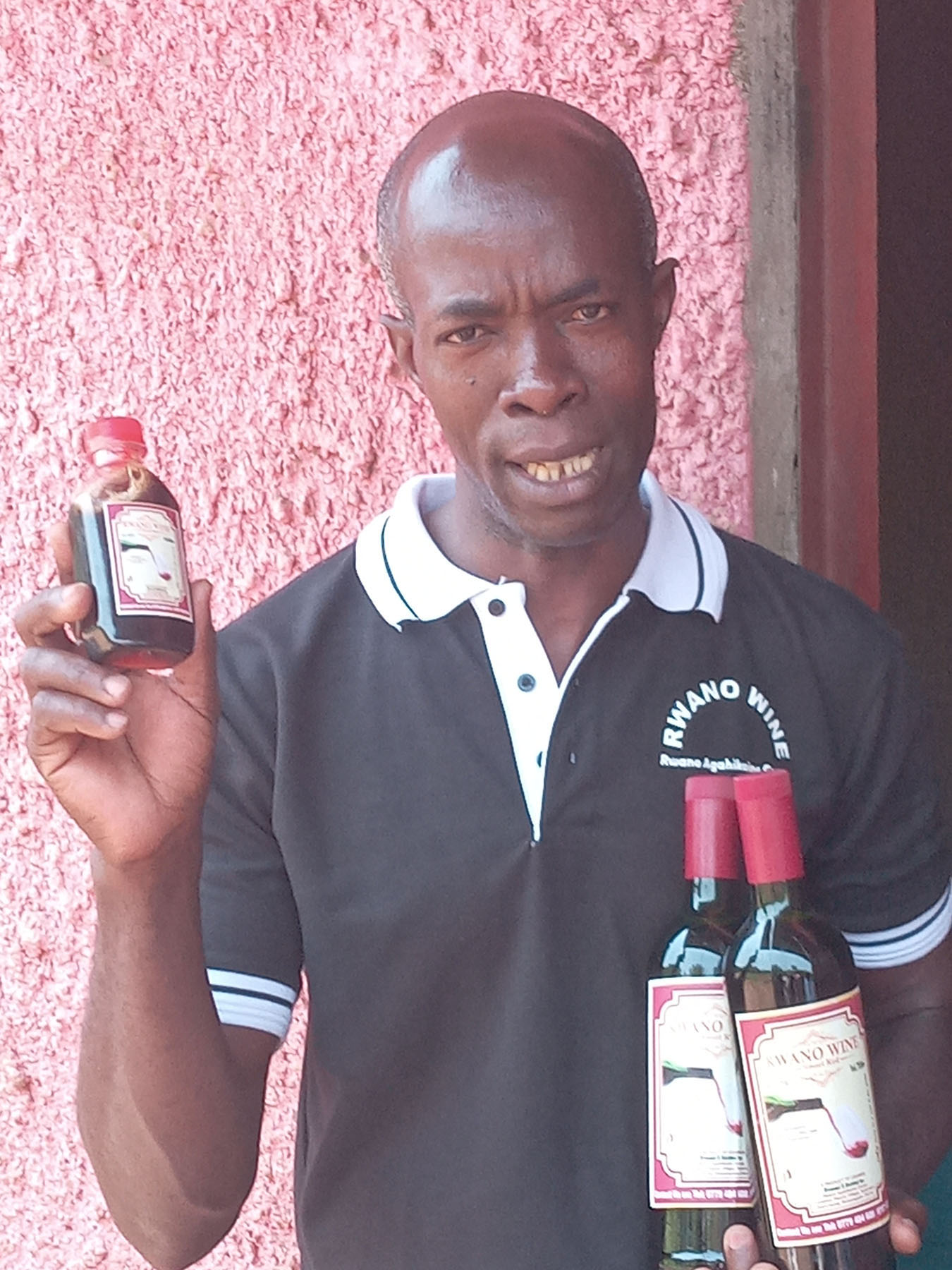How improved farming practices are boosting production, earnings in Bunyangabu
Bunyangabu district agriculture officer Gerald Tumwesigye said the district’s partnership with IFDC through the BRIGHT project supplements government efforts to support the smallholder farmers to enhance production, ensure food and nutrition security and increase household incomes.
Cliff Rutaisire (not showed in picture) inspects his banana plantation. The plantation increased production after he adopted better farming methods. (Photo by Stephen Nuwagira)
___________________
When you visit Cliff Rutaisire’s home, big bunches of bananas catch your eye right away.
The smallholder farmer in Rwano, Kabonero sub-county, in Bunyangabu district, says this is the result of the improved farming methods he adopted a few years ago. Rutaisire grows the Nasaba variety, but never used the recommended agronomical practices previously, which affected the plantation.
He says the situation was made worse by soil erosion that would wash away nutrients in the plantation, resulting in small-sized bananas that would cost about shillings 7,000. Presently, a big bunch of bananas ranges between shillings 25,000-30,000 (like those at Rutaisire’s farm that weigh up to 100kg).
However, Rutaisire and other smallholder farmers in Kabonero, who are members of the Rwano Agahikaine Group, were trained in proper agronomical practices and sustainable crop production a few years ago, which has helped in the restoration of affected areas and spurred output.
Conducted by Agri Terra through the Building Resilience and Inclusive Growth of Highland farming systems for rural Transformation (BRIGHT) project of the International Fertiliser Development Centre (IFDC), the farmers were equipped with proper crop husbandry skills and soil restoration methods, which have helped to boost production.
Moses Kateeba Bala, another banana farmer in Kabonero, said he learnt how to space, prune, and dehusk the bananas, as well as trenching and applying manure, among other skills. The farmer now harvests about 12 large bunches of bananas every two weeks, while Rutaisire gets 30 bunches a month, which has increased their earnings.
James Kwesiga, the BRIGHT project sustainable land use and crop production officer for the Rwenzori region, said they train farmers to rejuvenate the soils through various ways like mulching, construction of trenches, crop rotation, intercropping, agro-forestry and application of manure, among others.
“It is important that we train them in integrated soil management and conservation for sustainable land use because it helps to improve crop production of small householder farmers and ensure food and nutrition security in the region,” he said during a tour of beneficiary farmers in Bunyangabu district on September 1.
Moses Muzoora shows off some of wine products made from bananas by the farmers association. (Photo by Stephen Nuwagira)
Although the project links the farmers to agro-input dealers, they are also trained on how to make their own manure using locally available materials to improve the soil, he added.
The Rwano Agahikaine Group, led by Moses Muzoora, was also trained in banana wine making to safeguard them against fluctuation of banana prices. Started the venture in June this year, the venture has so far produced 10,000 litres of banana wine. Each member contributes a bunch of bananas monthly towards the venture. The wine is sold in local shops and in Fort Portal City.
Supporting govt
Bunyangabu district agriculture officer Gerald Tumwesigye said the district’s partnership with IFDC through the BRIGHT project supplements government efforts to support the smallholder farmers to enhance production, ensure food and nutrition security and increase household incomes.
“The farmers, especially in Kabonero sub-county, where the hills had been overused and left bare, were facing different challenges, including soil erosion and floods that would destroy crops whenever it rained heavily. However, these hills have now been restored in collaboration with the Bright project,” said the agriculture officer.
He added that the farmers have also been trained in postharvest handling and financial literacy, and were mobilised in cooperatives to ease marketing of their produce.
Over 80% of the population depends on agriculture, according to the district official.
Other farmers speak out
Grace Kahwa, a member of the group, said they were trained to plant beans in lines, which has helped to increase output. I planted 5kg of beans and got about 150kg last season. This compares to about 50kg before the training. Susan Kansiime, another member, said that planting in lines eases weeding, spraying and application of fertilisers. The beans planted in lines have a high outturn, meaning better earnings, she added.
The BRIGHT project is operating in highland areas of Kigezi, Rwenzori and Elgon, looking to empower over 60,000 households with smart farming practices for improved crop production, food security and better household incomes, among others.